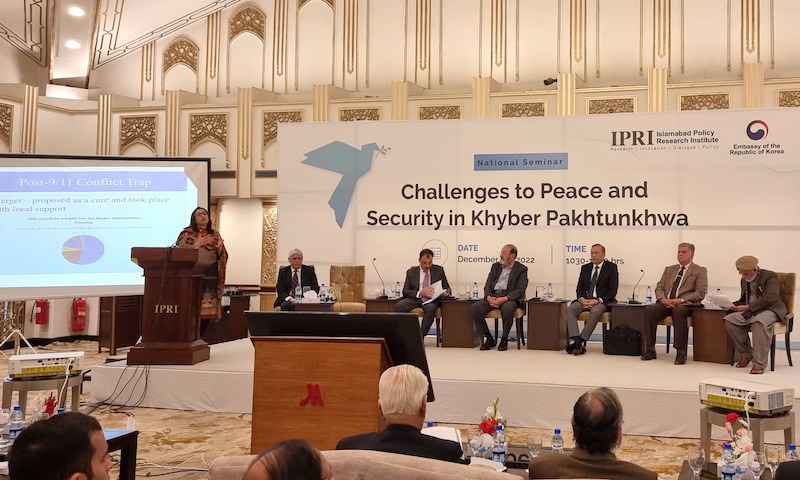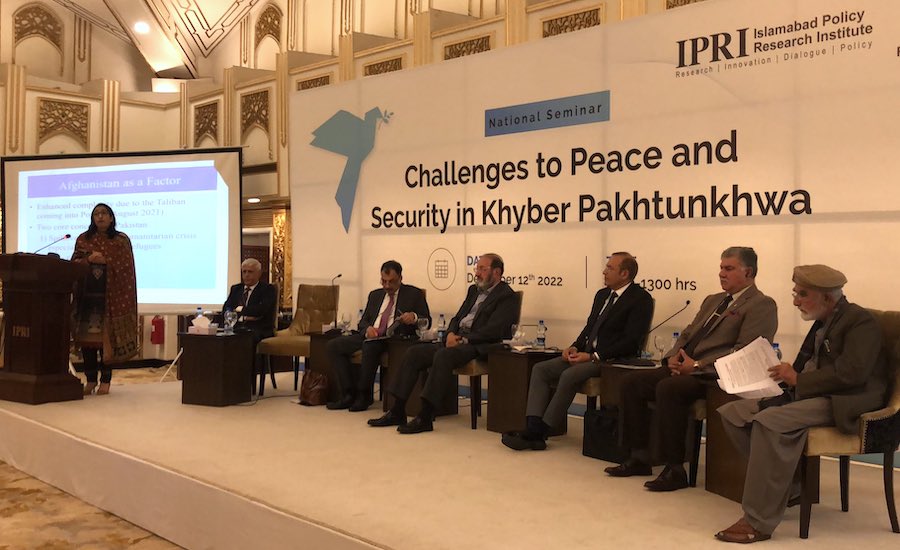Pakistan’s top strategic experts have urged all stakeholders to join hands and take coordinated measures and approaches to counter the re-emergence of terrorism in Pakistan’s border regions, particularly in the Khyber Pakhtunkhwa (KP) province.
Speaking at a high-profile seminar arranged by Islamabad Policy Research Institute (IPRI) in collaboration with the South Korean Embassy in Islamabad, top experts including former National Security Advisor Dr. Moeed Yusuf, ex-NSA Gen Nasser Khan Janjua, former Secretary Defence and Dr. Muhammad Zahid Latif suggested that there was a need to address the socio-economic issues of the region for a long-term approach to meet the challenges.
Moeed Yusuf rejected reports regarding a general amnesty to banned militant organization Tehreek-e-Taliban (TTP) militants and clarified that “There is no underhand deal with the TTP and such an impression is wrong.” It was pointed out that there is no such thing as blanket amnesty, and no bargains from the TTP to go against the constitution of Pakistan such as reviving the tribal belt, the former Federally Administered Tribal Areas (FATA), or downgrading the presence of security forces shall be accepted.
While some speakers noted that political polarization and economic instability in the country might have encouraged some terrorist groups but also highlighted the fact that for the first time Pakistanis, particularly the majority of KP and FATA people have turned against terrorism and are urging the State to take up the challenges.

Joint efforts needed for peace
Most speakers agreed that state institutions should adopt a transparent and unified to address the challenges arising from the re-emergence of terrorism following the withdrawal of foreign forces from Afghanistan.
Ambassador of South Korea, Suh Sangpyo, in his opening remarks declared that his country was eager to see peace prospects flourish in Pakistan, and added that Korean companies are very much interested in investing in the country. However, the Ambassador stressed that “durable peace in the settled and tribal areas is a must for broad-based serenity.”
Dr. Moeed Yusuf said that increasing concerns in the context of peace and security are of vital importance, and the same is in need of being addressed in a holistic manner.
The former NSA said that while Pakistan has chosen the route of geo-economics, peace within Pakistan and in the region is the key factor. He spoke about the Northwest corridor and said that fissures are evident.
“The environment around us is not in our control, and the fact of the matter is that we have a neighbor on our East which is negative to us and the Western frontier is troubled,” he analyzed.
Moeed Yusuf said that China is Pakistan’s only achievement in terms of ensuring cordiality in the region.
Strength of people against terrorism
The former NSA also noted that the ongoing unrest in Khyber Pakhtunkhwa is borne out of a fallout from Afghanistan, and he remarked that as far as counter-terrorism is concerned, Pakistan has a great track record.
The speakers while spelling out the dynamics of talks with TTP and its counterpart in Afghanistan said that they represent two different notions, and it is wrong to equate them as a singular entity.
It was also noted that there is no possibility of a resurgence of terrorism like in the past, and the State of Pakistan’s strength is incomparable to what it was 20 years ago.
Moreover, the people of KP are standing fast against terrorism, and no such attempts that were maneuvered in Swat in the early part of this century shall be re-enacted.
The real distinguishing factor is “the kind of reaction and kind of clarity in the minds of the people of Khyber Pakhtunkhwa who have stood up and said very clearly this is not acceptable, and in fact, they have forced the state into action” to prevent terror activities. “This strength [of people] alone is enough to ensure that there is no coordinated or organized resurgence of terrorism” in Pakistan, Dr. Yusuf said.

Coordination stressed
Experts urged complete coordination among various organs of the state, including provincial and federal governments, civil law enforcement, and armed forces, and the need for an institutional check and balance approach to fight out fissures and upheavals in Khyber Pakhtunkhwa.
The speaker pointed out that the state suffers from elite capture, and the need of the hour while fighting terror outfits and unscrupulous elements is to maximize cooperation with the locals by empowering them in decision-making. This is how the onus will move on to public space.
Lt. Gen (retd) Nasir Janjua, the former National Security Adviser, said that the TTP is a defeatist body, and all its workout is to somehow align with other non-state players to attract attention, and bargain a deal. He strongly opposed any bargaining with the TTP and said that the state must reassert its writ.
While talking about the involvement of two superpowers in southwest Asia, Janjua said the fact that Afghanistan and Pakistan survive as independent entities is a show of great resilience, and achievement. He called the war in Afghanistan a dirty war, wherein Pakistan is in a fixation mode.

